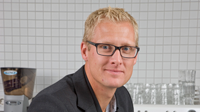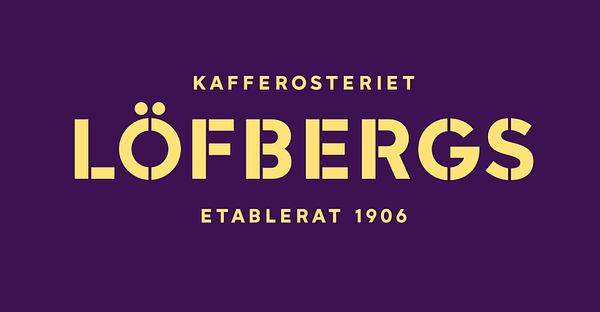
Press release -
Löfbergs Lila sets ambitious targets for sustainability: 100 per cent certified coffee within five years
Löfbergs Lila is already one of the world’s largest importers of ecological and Fairtrade coffee. But that’s not enough for the Swedish coffee company. The target is that all coffee sold by the family-owned business will be certified within five years. That’s one important part when Löfbergs Lila now intensifies its work on sustainability.
All employees of the company are involved in the sustainability programme that is being led by Lars Appelqvist, CEO of Löfbergs Lila. New, more ambitious targets have been set and concrete plans established for achieving each goal.
“As an importer of coffee we have a huge responsibility to ensure that both people and the environment are treated fairly and correctly. We are already doing far more than is expected, but we still want to do even more. Consumers must always be able to trust that Löfbergs Lila is good coffee – in every sense,” says Lars Appelqvist.
Löfbergs Lila has been caring for the environment and coffee farmers around the world for over 100 years. Löfbergs was the first company in Sweden to stop using aluminium in coffee packaging, for example, and over the past 20 years the company has halved electricity consumption per ton of produced coffee. Meanwhile, purchases of certified coffee have grown steadily. Today, Löfbergs Lila is one of the world’s largest importers of ecological and Fairtrade coffee. Every fourth cup off coffee sold by the company is certified.
Good coffee
Certification means that the coffee must be grown in accordance with specified criteria. This includes avoiding the use of child labour and promoting ecological production, for example. Through external verification by a third party, the consumer gets a guarantee that the product matches the producer’s promises. Löfbergs Lila also carries out its own checks, even on coffee that not yet has been certified.
“I can stick my neck out and say that we travel to visit coffee farmers more than most other coffee companies. Our aim is to meet the coffee farmer and then do business at source. This gives us good control over the entire process, from coffee bean to cup of brewed coffee,” says Lars Appelqvist.
Contributing to positive change
Löfbergs Lila is participating in a series of industry initiatives to contribute to long-term sustainable coffee production. This includes, for example, International Coffee Partners (ICP), which aims to improve conditions for coffee farmers. It’s another example of how Löfbergs Lila promotes increased production of certified coffee.
“Naturally, this helps us find even more certified coffee that matches our flavour profile and our quality requirements. This autumn we will travel to Africa and visit Tanzania, Ethiopia and Uganda, and then we will continue our discoveries in Central America,” says Lars Appelqvist.
Taking responsibility from bean to cup
Demand for certified coffee – coffee that is grown in a controlled way – has risen in recent years. But certified coffee is not the only item on Löfbergs Lila’s sustainability agenda. Reduced consumption of materials, lower energy usage and 100 per cent renewable energy are just some of the other targets as Löfbergs Lila aims to strengthen its position as Sweden’s most sustainable coffee.
“As a family-owned business we have a long perspective on issues like these. I am convinced that it is right to make it easier for consumers who want to make a difference to make that choice,” says Lars Appelqvist.
For more information, please contact:
Lars Appelqvist, CEO, Löfbergs Lila, 00 46 54-14 01 29
***
FACTS ABOUT CERTIFICATION
- According to the Swedish National Coffee Association, around 20 per cent of all coffee sold in Sweden is certified, with Krav and Fairtrade the most common brands of certified coffee.
- Swedes buy more certified coffee in cafés, restaurants and other such outlets than they do in shops.
- Every fourth cup of coffee sold by Löfbergs Lila is certified coffee.
- Half of the coffee that Löfbergs Lila sells to cafés, restaurants and similar outlets is certified coffee.
Examples of certification
- Krav
Krav is the name of Swedish eco-labelled food. The label is a guarantee that food is produced without artificial fertilizer or chemical pesticides.
- Fairtrade
An independent product label that creates opportunities for farmers and employees in developing countries to improve their working living conditions.
- UTZ certified
Sets requirements for sustainable cultivation of coffee, cacao and tea. Farmers are given training in business skills, employment conditions and environmental conservation. Checks are made by independent parties. Product traceability systems guarantee that raw materials have genuinely been grown and harvested responsibly.
- Rainforest Alliance
This is a non-profit organization that works to protect biological diversity and promote sustainable development by influencing methods for land use, business practices and customer behaviour.
- EU EcoLabel
The EU official eco-label. The products are examined from a life cycle perspective, from raw material to waste. The products must meet strict environmental, functional and quality requirements. The requirements increase continuously.
Topics
Categories
Löfbergs Lila is one of the largest family-owned coffee roasters in the Nordic countries. The company has 280 employees and a turnover of SEK 1.5 billion. The head office is situated in Karlstad, Sweden and the company has its own roasting-houses in Sweden, Norway, Denmark and Latvia. Löfbergs Lila was founded in 1906 and is today one of the world's largest importers of ecological and Fairtrade labelled coffee. Löfbergs Lila also owns the tea brand Kobbs. www.lofbergslila.se

